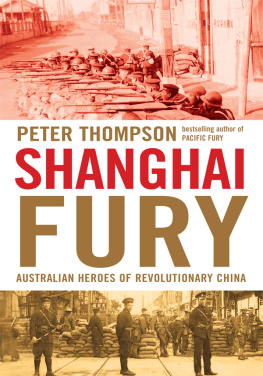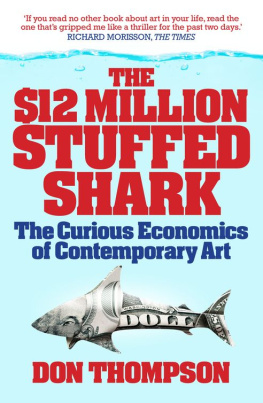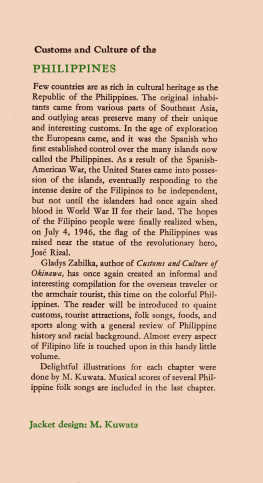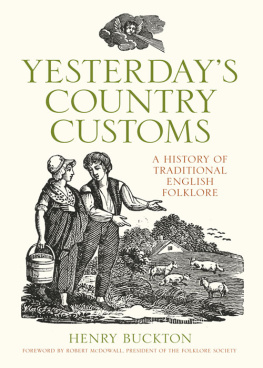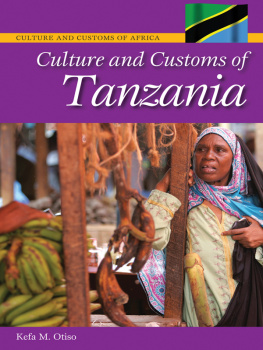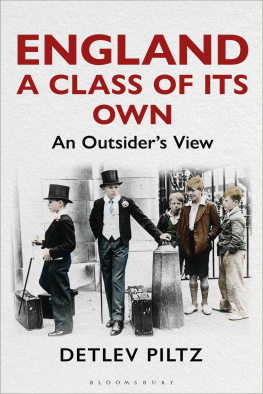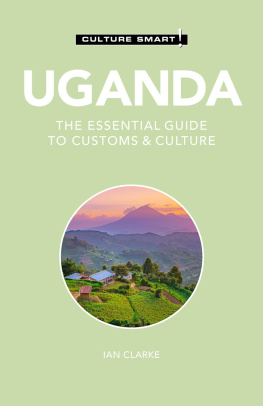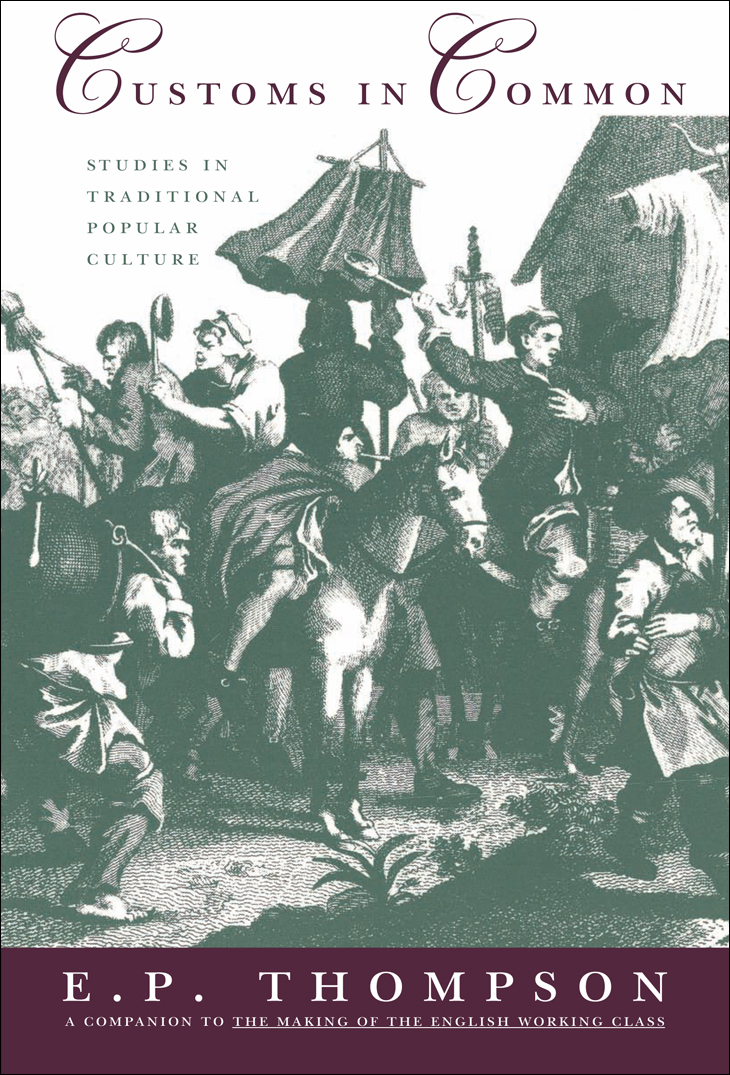CUSTOMS IN COMMON
By the same author:
WILLIAM MORRIS
THE MAKING OF THE ENGLISH WORKING CLASS
WHIGS AND HUNTERS
POVERTY OF THEORY
WRITING BY CANDLELIGHT
THE HEAVY DANCERS
WITNESS AGAINST THE BEAST
MAKING HISTORY
THE ROMANTICS

Copyright 1993 by E. P. Thompson
All rights reserved.
No part of this book may be reproduced, in any form, without written permission from the publisher.
First published in the United States by The New Press, New York, 1992
This paperback edition published by The New Press, 1993
Distributed by Perseus Distribution
ISBN 978-1-62097-216-8 (e-book)
Library of Congress Cataloging-in-Publication Data
Thompson, E. P. (Edward Palmer), 19241993
Customs in common : studies in traditional popular culture / E.P.
Thompson.1st American ed.
p. cm.
Includes index.
1. EnglandSocial conditions18th century. 2. EnglandPopular cultureHistory18th century. 3. EnglandSocial life and customs18th century. 4. Working classEnglandHistory18th century. 5. EnglandEconomic conditions18th century. I. Title.
HN398.E5T48 1992
306.0942'09033dc20
92-13039
The New Press publishes books that promote and enrich public discussion and understanding of the issues vital to our democracy and to a more equitable world. These books are made possible by the enthusiasm of our readers; the support of a committed group of donors, large and small; the collaboration of our many partners in the independent media and the not-for-profit sector; booksellers, who often hand-sell New Press books; librarians; and above all by our authors.
www.thenewpress.com
Printed in the United States of America
Contents
Guide
to Martin Eve
uncommon customer
List of Illustrations
The studies in this book were intended as a single closely-related argument. This argument is rehearsed in the Introduction. It has, however, taken much longer to complete than I could ever have intended. It commenced the work on time and on the moral economy soon after I published The Making of the English Working Class over twenty years ago. Then it was delayed by work on eighteenth-century crime, which resulted in Whigs and Hunters and (with colleagues in the University of Warwicks Centre for the Study of Social History) Albions Fatal Tree. Then, in the early eighties, I was turned aside once again, by the emergency of the second cold war and by the heavy demands of the peace movement. I do not regret this: I am convinced that the peace movement made a major contribution to dispersing the cold war, which had descended like a polluting cloud on every field of political and intellectual life. These difficulties (as well as ill health) seriously delayed the completion of Customs in Common.
I should explain now what I have done to make a consecutive argument. Two chapters are reproduced with no change from earlier publication. These are Time, Work-Discipline and Industrial Capitalism, first published in Past and Present, no. 38, December 1967, and The Moral Economy of the English Crowd in the Eighteenth Century, Past and Present, no. 50, 1971. In the first case, while interesting new work has been done on the question of time, none of it seemed to call for any major revisions to my article. I have left the moral economy to stand for a different reason. The thesis has been much discussed, criticised and developed, and at some points overtaken by subsequent research. At first I laboured to revise and to up-date it. But this proved to be a hopeless task. It was a kind of retrospective moving of the goal-posts. I found that I was modifying a text upon which much commentary by other scholars had been hung. I have therefore republished the original study and have written a quite new study, of greater length, The Moral Economy Reviewed, in which I respond to some critics and reflect upon the issues raised by others.
The other studies in the book have either been extensively revised or appear here for the first time. The Introduction and Patricians and Plebs include passages which first appeared in Patrician Society, Plebeian Culture, Journal of Social History, Vol. 7, no. 4, summer 1974, and Eighteenth-century English society: class struggle without class?, Social History, Vol. 3, no. 2, May 1978. A shorter version of Rough Music appeared as Rough Music: Le Charivari anglais in Annales: conomies, Socits, Civilisations, 27e Anne, no. 2, Mars-Avril 1972. I am grateful to the editors and journals concerned for allowing me to draw upon this material.
I am grateful also to those institutions and those colleagues who have afforded me hospitality and the opportunity to teach and to keep in touch with the historical profession over this long period. These include several American universities (Pittsburgh, Rutgers, Brown, Dartmouth College), as well as a circuit of Indian universities and the Sir Douglas Robb lectures at the University of Auckland, New Zealand. More recently I am especially grateful to three universities which took the risk of inviting me as a visitor rusty as I was and enabled me to rehabilitate myself as a scholar, after the long diversion of the peace movement years. These were, first, Queens University, Kingston, Ontario (1988); the University of Manchester, which awarded me a Simon Senior Research Fellowship in 1988-89; and Rutgers University, which appointed me as Raoul Wallenberg Distinguished Visiting Professor in 1989-90, working with the Center for Historical Analysis. Without this generous assistance, and the stimulus of congenial colleagues, I might have lost touch with my trade. Finally, my warm thanks are due to the University of Birmingham, for affording to me library and research facilities as a Fellow of the Institute for Advanced Research in the Humanities.
If I were to thank everyone who has sent me references (for example of rough music or of wife sales) this preface would be several pages longer. In some cases I have acknowledged donors in my footnotes. I must beg forgiveness for overlooking others. Among those who have passed on information or who have exchanged views are: John Beattie, the late Kathleen Bumstead, Andrew Charlesworth, Robin Clifton, Penelope Corfield, Anna Davin, Natalie Davis, Isabel Emmett, the late G. Ewart Evans, John Fine, John Fletcher, Vic Gammon, John Gillis, Inge Goodwin, Jack Goody, the late Herbert Gutman, Julian Harber, Brian Harrison, J. F. C. Harrison, Martin Ingram, Joan Lane, Louis Mackay, the late David Morgan, Polly Morris, Bryan Palmer, Alfred Peacock, Iorwerth Prothero, Arnold Rattenbury, Ruth Richardson, John Rule, Raphael Samuel, Peter Searby, Robert Shenton, Paul Slack, Len Smith, Michael Sonenscher, Joan Thirsk, Keith Thomas, Dror Wahrman, John Walsh, E. R. Yarham, Eileen and Stephen Yeo. Very particular thanks are due to the late E. E. Dodd, who undertook many searches for me in the Public Record Office, and to Malcolm Thomas (now Librarian at Friends House, Euston Road) whose gifted services I was once fortunate to have as a research assistant; to Adrian Randall, Wendy Thwaites and John Walter, for acute commentary on my moral economy texts; to Douglas Hay and Peter Linebaugh, formerly co-editors of Albions Fatal Tree, for advice on the law, on crime, and on many other matters; to Robert Malcolmson and to Rex Russell, for their generosity in passing on references as to wife sales and agrarian matters; to Roy Palmer, for sharing his inexhaustible and expert knowledge of ballad and broadside literature; to Nicholas Rogers, for keeping me in touch with his outstanding work-in-progress on the London and provincial crowd; and to Jeanette Neeson, whose work on eighteenth-century




